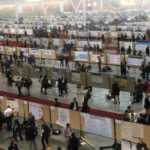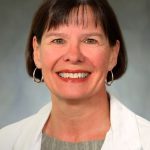“There is a mixture of hot and emerging topics, such as ion channels and bioimaging,” explains Brian F. Mandell, MD, PhD, chair of the AMPC, “as well as up-to-date reviews of topics that are of increasingly broad interest.”
The AMPC is using more translational components as a way of increasing the basic scientist’s interaction with clinicians, he explains. In keeping with this, the meeting will offer sessions on osteoclasts, implications for the development and treatment of osteoarthritis, T-cell subsets, and a year in review – all of which will be of interest to both the clinician and the basic researcher.
Dr. Mandell is particularly excited about the speakers in this year’s program. “We have several truly high-visibility speakers, and we have expanded the venue for several of our rheumatology research award winners,” he says. “We are extremely fortunate to have Dr. Philip Sharp, a Nobel Laureate, delivering a talk on microRNAs, and Dr. Judah Folkman, a legendary researcher in angiogenesis, presenting an introductory talk at our abstract mini-symposium on angiogenesis, cell to cell adhesion, migration, and vascular biology in arthritis and inflammation.”
Additionally, the recipient of the Arthritis Foundation’s Lee C. Howley, Sr. Prize for Arthritis Research, Gary Firestein, MD, will introduce a mini-symposium, “RA Pathogenesis: Molecular Mechanisms” with a lecture on new therapeutic targets in RA.
The AMPC has also invited the ACR Research and Education Foundation (REF) lecture recipients, Judith James, MD; Regis O’Keefe, MD, PhD; Steven L. Teitelbaum, MD; and Paul H. Plotz, MD, in the areas of lupus, orthopedics, bone research, and research contributions to rheumatology, respectively, to present lectures within sessions of related areas.
“This should provide enjoyable and instructive sessions for senior researchers and novices alike,” says Dr. Mandell.
To maximize opportunity, attendees will be able to participate in sessions without missing other topics of interest running concurrently. “We plan for the first time to offer taped replays of the clinical sessions in our encore theater,” notes Dr. Mandell. “We hope this will enable clinicians who also have basic science interest to attend the science sessions in person, participating in the live dialogue, without missing out on their clinical reviews.”
With the basic science symposia, state-of-the-art lectures, and additional opportunities to interact with clinicians, basic researchers will have a packed schedule at this year’s meeting. For more information on the Annual Scientific Meeting, visit www.rheumatology.org/annual.
CORC Forum Will Focus on Practice Support
Faced with the incredibly complex and rapidly changing field of rheumatology, practicing physicians need tools to build stronger, more profitable practices. To meet this need, the ACR is gathering leading healthcare specialists at the ACR Committee on Rheumatologic Care (CORC) Forum during this year’s annual meeting. The forum, “Building a Stronger Physician Practice,” will take place on Friday, November 9, from 2:30–4 p.m., and will cover:
- Purchasing malpractice insurance;
- Using clinical research studies to increase your bottom line; and
- Increasing profitability by integrating nurse practitioners and physician’s assistants into a rheumatology practice.
The forum speakers are experts in their fields and will share their knowledge and experiences in an informal and comfortable setting. Scheduled speaker Robert Conroy is a veteran presenter at the ACR annual meetings and is recognized as an authority on healthcare law. Conroy is the former chief of New York City’s Medical Malpractice Unit and founding director of the New Jersey State Bar Association’s Health and Hospital Law Section. Conroy’s presentation will focus on the Medicare audit process, ways to respond, and your rights when faced with an audit.


